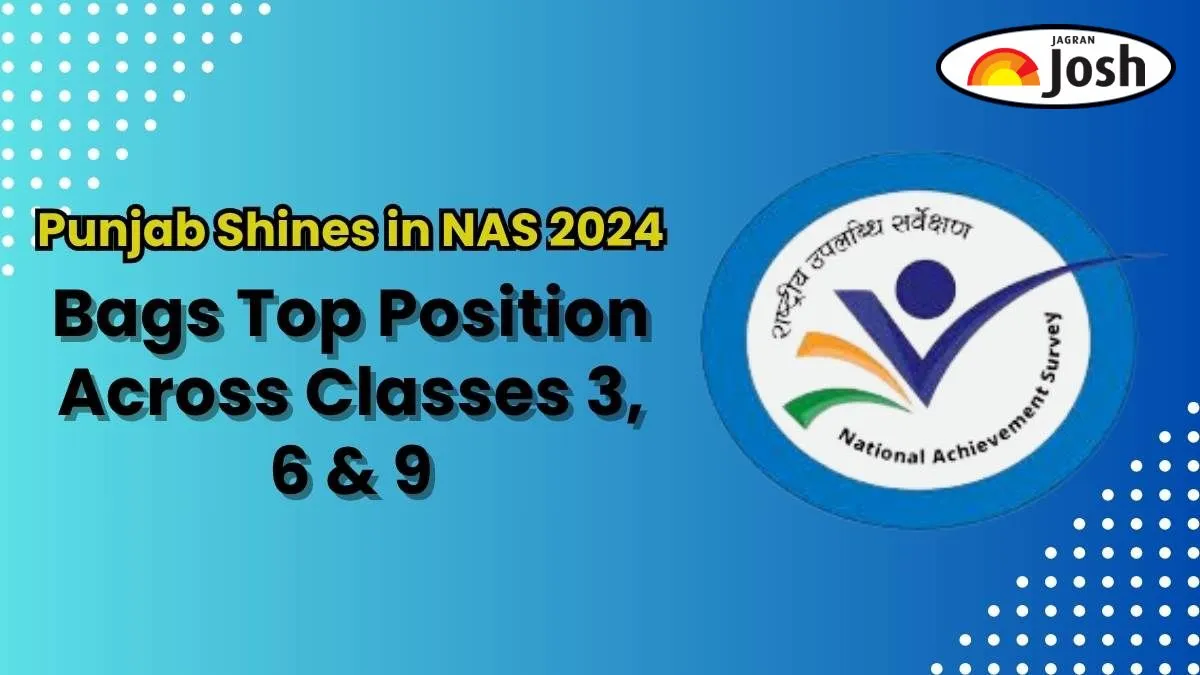Punjab has emerged as the top-performing state in the National Achievement Survey (NAS) 2024, securing the highest position across Classes 3, 6, and 9. The Ministry of Education and NCERT conducted the NAS 2024 assessment, which evaluated foundational and middle school education standards by analysing the learning outcomes of lakhs of students nationwide. Punjab outperformed all other states and union territories, reflecting the impact of its education reforms, teacher training programmes, and student-focused initiatives. The stellar performance not only highlights Punjab’s academic excellence but also reinforces its growing reputation as a model for quality public education in India.
Punjab’s Rankings in NAS 2024
Punjab’s consistent academic performance across multiple grade levels has set a new benchmark in school education across the country. The state’s impressive scores in Classes 3, 6, and 9 reflect not just student achievement but also the effectiveness of policy-level interventions and grassroots execution. Here's a breakdown of Punjab’s scores compared to other top-performing states:
- Class III: Punjab secured 80 marks, surpassing Himachal Pradesh (74) and Kerala (73)
- Class VI: Punjab and Kerala tied at 67 marks—ahead of Dadra & Nagar Haveli & Daman & Diu, and Chandigarh (60)
- Class IX: Punjab stood alone in first place with 57 marks, narrowly overtaking Kerala (56) and Chandigarh (53)
Punjab’s Education Minister Hails NAS 2024 Win, Highlights NEET & JEE Success
Punjab’s School Education Minister, Harjot Singh Bains, hailed the NAS 2024 performance as a “stellar achievement,” underscoring the state government’s unwavering commitment to improving public education. He credited the success to consistent reforms, teacher empowerment, and data-driven policymaking that have strengthened classroom learning outcomes across the board
In addition to NAS, Minister Bains proudly highlighted the academic strides made by students in national-level entrance exams. A total of 845 students from government schools cleared NEET 2024, while 265 cracked JEE Mains, showcasing the rising academic competitiveness of Punjab’s public school system. These milestones reinforce the success of state-supported initiatives like PACE, which offers free coaching and residential camps for meritorious students from underprivileged backgrounds
Why Punjab Excelled in NAS 2024
Punjab’s top performance in the National Achievement Survey 2024 is the result of a strategic blend of policy reform, grassroots execution, and student-focused initiatives. Here's what set the state apart:
- Strong Political Will & Investment: The AAP-led Punjab government prioritized public education, ensuring consistent funding, monitoring, and accountability at every level of the school system.
- ‘Sikhiya Kranti’ & PACE Initiative: Under the flagship Sikhiya Kranti reforms, the PACE (Program for Advancement of Competitive Exam) initiative offered free coaching, live classes, mock tests, and residential camps for meritorious yet underprivileged students. These efforts helped many crack national-level exams like NEET and JEE.
- Teacher Empowerment & Tech Integration: Punjab implemented systematic teacher training, regular Parent-Teacher Meetings (PTMs), and digital learning tools, resulting in stronger foundational outcomes across language, math, and science.
These focused interventions collectively elevated classroom learning and bridged achievement gaps, making Punjab a national model for school education reform. Punjab’s top rank in NAS 2024 across foundational and middle school levels, along with the surge in competitive exam success, marks a milestone in India’s state-level education performance.
About the National Achievement Survey (NAS)
The National Achievement Survey (NAS) is a nationwide assessment conducted by the Ministry of Education through NCERT to evaluate the learning outcomes and academic performance of students in Classes 3, 5, 8, and 10. Held every three years, NAS measures students' understanding in core subjects like language, mathematics, science, and social science. The survey provides valuable insights into the effectiveness of school education policies, helping states identify learning gaps and improve teaching strategies.

Comments
All Comments (0)
Join the conversation